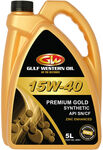A good deal to share especially after these guys gave so much loyalty credit recently, in last week only, also good if you missed a amazon prime deal oil deal. (infact could possibly work out cheaper if you still got a spare $10 credit laying around somewhere in your email).
Also generally speaking since this deal requires a club membership, you wont be able to price beat/match at other stores (they would usually have clause preventing price matching offers requiring membership)
if you are not a member you, can join for free.
Product Info
Gulf Western Premium Gold 15W-40 is a high-quality semi synthetic engine oil designed and formulated for everyday passenger vehicles and light diesel engines requiring API SN/CF specifications or earlier. It reduces oil consumption, exhibits superior anti-oxidation capabilities while offering excellent protection against cold start wear and fantastic thermal stability in harsh conditions. Gulf Western Premium Gold is recommended for use in petrol, light diesel and LPG engines and is also suitable for use in 4 stroke motorcycle engines with wet clutches.
To find the oil type and viscosity suggested for your vehicle; either add your vehicle to My Garage or check with your manufacturer, vehicle user manual, your local mechanic or head in-store and talk to one of our friendly team.
Features
5 Litre
15W-40
API SN/CF
Oil Composition Semi-Synthetic
ACEA A2/B2
API SN PLUS/SN/CF
Ford ESE- M2C -153E
Military Standard MIL-L-46152E, 2104E
Versatile engine oil for petrol, LPG & light diesel engines requiring a API SN/CF
Can be used in both turbo & naturally aspirated engines




